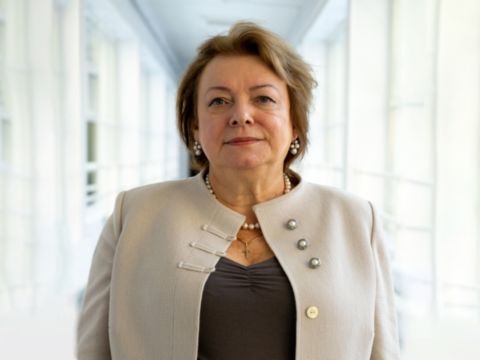International applicants wishing to study in Master's degree or postgraduate programmes will get a chance to obtain their education at South Ural State University (SUSU) free-of-charge. For that they must be among the winners of the Open Doors International Olympiad. SUSU, as one of the leading universities in Russia and winner of the Priority 2030 project, is the organizer of the Olympiad.
Candidates and Doctors of Sciences of South Ural State University are ready to become academic advisors of international Master’s degree students and postgraduates in various scientific fields.
Doctor of Sciences (Pedagogy), Professor Irina Kotliarova supervises the programmes on studying the problems of full-time, online and offline continuing (formal, nonformal, and informal) education of the future specialist.
– Irina, what opportunities does the Olympiad open before the university and an academic advisor?
– We could attract such postgraduates who are already prepared to conduct research activities, who have good command of language, and these must be people focused on performing research namely in this specific field. In addition, if we take our scientific field, then we need researchers who are aware of the world-wide, global character of the problems in education. For instance, the phenomena of digitalization, digital literacy and digital competence – these issues are topical for the whole world. The issues of preserving our surrounding environment, developing of the global thinking, forming the readiness of specialists to participate in the processes of sustainable development of the world – these are the issues to be studied within the frameworks of the modern pedagogy. We have launched great many nation- and world-level programs and projects, the fulfilment of which touches upon education. On one hand, their introduction helps solve pedagogical problems, and on the other hand, mistakes in their practical implementation may lead to serious consequences. Studying the possible risks and problems – all of that is part of the field of pedagogical research.
– What are postgraduates engaged in? What the process of learning is like?
– The progamme is called "Methods and Technology of Professional Education" (progamme number 5.8.7). It implies studying the problems of training specialists for various sectors of economy, science, or any other sphere of professional activity за people, that is, the problems of higher and professional education. If we take the specifics of postgraduate studies, it is important to note that over the past 40 years we have formed a scientific school with rich traditions, we organize a continuously functioning scientific seminar on the problems of pedagogy in professional education, and postgraduates actively participate in scientific conferences. We organize and hold conferences of various level, we publish the Education. Educational Sciences journal (Bulletin of SUSU), which is recommended by the State Commission for Academic Degrees and Titles, and where articles are published by scientists, research fellows and postgraduates not only from our university, but also from other scientific and research institutions.
– Do you have experience in working with international Master’s degree students and postgraduates? How do they conduct research?
– We've already had international students. One postgraduate, S. Meng, successfully defended his dissertation. Now he works as dean of the Faculty of Eastern Languages at the Hebei Professional Foreign Trade Economic Institute (People's Republic of China). Within the period of four years a group of Master’s degree students is formed, who study in programmes taught completely in the English language, and among them there are students who could continue their research in postgraduate programme. This is a Philology programme where we teach them the History and Methodology of Science, Pedagogy of Continuing Education, and Technology of Scientific Text Writing. We not only provide the theory, but students write articles for international conferences cited in Scopus, and for top-rated journals. Thus, last year, two articles by our postgraduates were published in Q1 journals.
– How does the Olympiad help develop the international collaboration between the department and our university, and universities from other countries?
– We try to develop the international collaboration with several countries. For many years now, we have been working with University of South Bohemia in České Budějovice, we have joint publications in journals, and we organize conferences and publish monographs. We also collaborate with our partners from China, Croatia, and Finland. It is important for us to work with international students because there are problems which can only be solved by joint effort. Thus, out university participates in the process of education internationalization. And if we look at this question globally, then we learn from each other. While preserving our national traditions of education, we mutually enrich our practices of both research and educational activities, and improve the quality of education in the world. The Open Doors Olympiad is a wonderful opportunity to learn from each other, and not only mutually enrich and develop culture, but also move science forward.
South Ural State University (SUSU) is a university of digital transformations, where innovative research is conducted in most of the priority fields of science and technology development. In accordance with the strategy of scientific and technological development of the Russian Federation, the university is focused on the development of big scientific interdisciplinary projects in the field of digital industry, materials science, and ecology. In the Year of Science and Technology, SUSU has become the winner in the in the competition under the Priority-2030 program. The university acts as a regional project office of the World-class Ural Interregional Research and Education Centre (UIREC).




